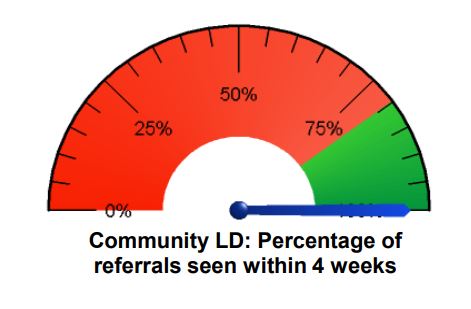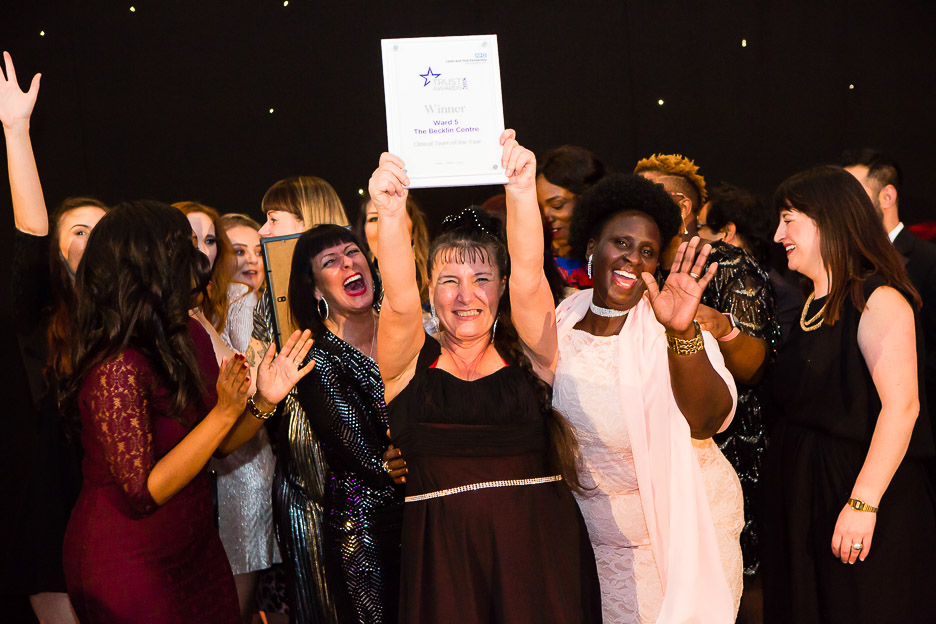Sue's Post Board Blog Sept 2019
Our Chair Professor Sue Proctor blogs with her highlights from our Trust Board meetings every two months.

Hello,
Welcome to my September 2019 blog following the Trust Board meeting on Thursday 26 September (read the papers on our website here).
For our sharing stories section we were joined by Mark, a service user with bipolar disorder.
We were delighted to welcome Mark who has taken a leading role in our newly revamped patient experience and involvement work, and is co-chairing the steering group.
Mark described how a number of traumatic incidents throughout his life had led him into mental health services, first in Scotland and then with us in Leeds. Mark left us with a few clear messages:
- We need to encourage people to become interdependent in society, rather than dependent on services
- There needs to be greater parity between mental and physical health services
- Our Trust should be “best in class” and make it a place that people want to come and work – something we’ve articulated in our strategy, and
- We need to stop the ‘’revolving door’’ of patients coming in and out of services.
Mark also shared some thoughts on taking (or not taking) responsibility or accountability for issues and decisions. This is something the Trust takes seriously. We recognise working in a leadership role in mental health services is complex and demanding – and we run excellent leadership development programmes through which we look to prepare our managers and clinical leaders for the complex responsibilities they take on.
Update from the chief executive
Sara updated us on the big online conversation we’re having with staff about the culture within our Trust. You can find out more about that in Sara’s video here.
On day four of the big conversation around 450 staff had got involved, providing around 770 contributions which include ideas, comments and votes. This is a great start and we look forward to seeing the final report.
Sara also updated us on the wider health and care system work she’s involved in. A draft five year plan for the West Yorkshire and Harrogate Health and Care Partnership has been circulated. This sits above the more local plans we are developing, such as the one for Leeds. Sara explained these are long documents written for a professional audience on how we’re going to deliver the NHS Long Term Plan. Work will need to be done to translate them into something more accessible before we share them widely.
The West Yorkshire Mental Health, Learning Disabilities and Autism Collaborative includes us, Bradford Care Trust, South West Yorkshire Partnership Trust and Leeds Community Healthcare Trust. The group continues to evolve and is currently looking to respond to an opportunity for the ongoing commissioning of veterans’ mental health services.
Sara brought our attention to the launch of Public Health England’s Every Mind Matters campaign on 7 October. The campaign aims to support everyone to feel more confident in taking action to look after their mental health and wellbeing by promoting a range of things people can do for themselves.
How are we doing on quality and performance?

The Board received the Combined Quality & Performance Report (item 11 page 44).
Firstly – well done to the Community Learning Disabilities Team who saw all their referrals within four weeks during August.
Our Community Mental Health Teams have been performing well too, with 83% of referrals seen face-to-face within 15 days and 93% of inpatients receiving a follow up within 7 days of discharge.
There was good performance to note by the Acute Liaison Psychiatry Service (ALPs) and the Liaison in-reach service who work with patients in Leeds General Infirmary and St James’ Hospital. ALPs are close to consistently achieving their target of seeing 90% of all patients within one hour, and the in-reach service is nearly there on making 90% of assessments within 24 hours.
Bed occupancy, delayed transfers of care and length of stay on our inpatient mental health wards are still challenging and we’re still seeing too many patients placed out of area. We’re looking at our crisis services to see how successful they are at preventing avoidable admissions and supporting early discharge. However, key external developments such as additional supported accommodation beds and a crisis house are not going to be in place until later this year – so we are not anticipating much change in the short term.
Improving opportunities for ethnic minority and disabled staff
Claire Holmes, our Director of Organisational Development and Workforce, shared her report on increasing opportunities and removing barriers for Black and Minority Ethnic (BAME) staff.
Her Workforce Race and Disability Equality Progress report showed some disappointing trends and areas we need to focus on. These include BAME staff:
- not being appointed to jobs following shortlisting
- experiencing harassment, bullying or abuse from other staff
- reporting discrimination at work from their manager or team, and
- not believing that the Trust provides equal opportunities for career progression or promotion.
In terms of our performance against the Workforce Disability Equality Standard (WDES) there was more of a mixed picture. A recent report comparing us with similar organisations showed our staff with physical disabilities reported:
- lower levels of staff feeling pressured to come to work when not feeling well
- they were generally satisfied with their job and access to reasonable adjustments, and
- lower levels of harassment, bullying and abuse from managers.
However, they reported higher levels of bullying and harassment from colleagues and service users/members of the public, and fewer opportunities for career progression and promotion.
Claire told the Board the kind of cultural change required to improve this picture would not be a quick fix. Senior Trust leaders attended an event in September to discuss how to improve equality and inclusion in the workforce. We look forward to the ideas from this event taking shape into actions soon.
Our newly formed Workforce Committee will be taking oversight of this issue and a number of initiatives are planned including a focus on shortlisting, succession planning and our disciplinary process.
The Board was also asked to support a specific mentoring programme for BAME colleagues which we were happy to approve.
Workforce and Organisational development
Claire then updated us on two important Trust staff engagement initiatives.
 Firstly; our yearly Trust Awards ceremony which takes place on 8 November. This is where we celebrate some of the great people we have, and great work they’ve done over the year – like Ward 5 at the Becklin Centre who won Clinical Team of the Year in 2018 (pictured).
Firstly; our yearly Trust Awards ceremony which takes place on 8 November. This is where we celebrate some of the great people we have, and great work they’ve done over the year – like Ward 5 at the Becklin Centre who won Clinical Team of the Year in 2018 (pictured).
Some of our non-executive directors were asked to judge the nominations, of which we’ve had 150, and they said the process had felt professional and well organised.
Secondly; it’s that time of year again when we’ll be surveying all our staff about what it’s like to work here. I’m delighted to see we’re inviting all 500 of our bank staff to take part for the first time this year.
Financial matters
We remain in a fairly healthy financial position and at month five (August) we’re reporting a £329,000 surplus. Our main cost pressures are staffing our inpatient wards, out of area placements and medical agency costs.
We also received some good news from Leeds Clinical Commissioning Group which has agreed to pay for extra staff to cover shifts when a large number of our front line staff will be trained on our new electronic patient record system ‘CareDirector’ before it goes live in February 2020.
Sue
Read more about our Chair Professor Sue Proctor here.